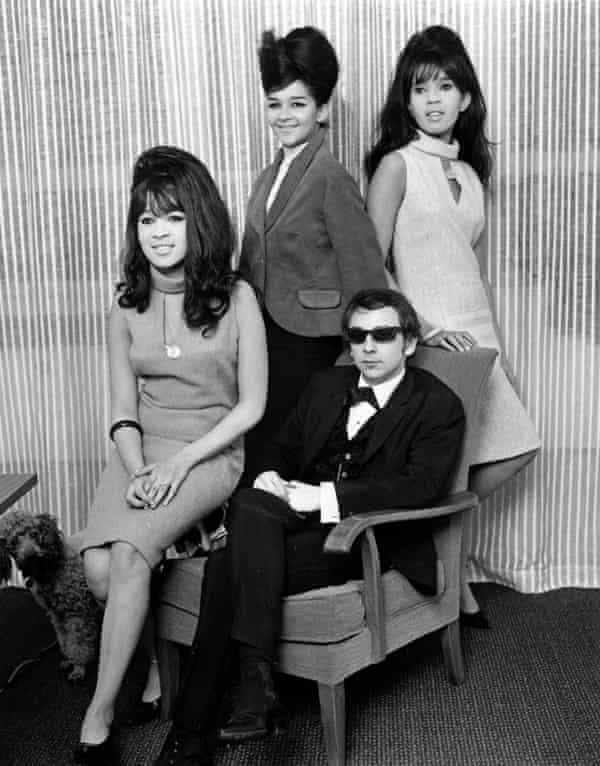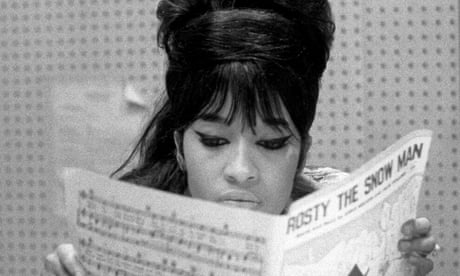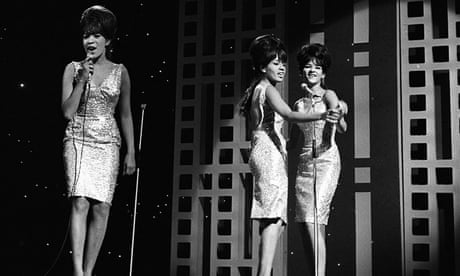Ronnie Spector, pop singer who fronted the Ronettes, dies aged 78
Influential singer of hits including Be My Baby, who married abusive producer Phil Spector, dies of cancer

Influential singer of hits including Be My Baby, who married abusive producer Phil Spector, dies of cancer

Ronnie Spector performing in 2014.
Photograph: Samir Hussein/Redferns/Getty Images
Ben Beaumont-Thomas
Wed 12 Jan 2022
Ronnie Spector, the singer who defined the sound of mid-century girl groups as the frontwoman of the Ronettes, has died aged 78.
A statement on her website states:
Our beloved earth angel, Ronnie, peacefully left this world today after a brief battle with cancer. She was with family and in the arms of her husband, Jonathan.
Ronnie lived her life with a twinkle in her eye, a spunky attitude, a wicked sense of humor and a smile on her face. She was filled with love and gratitude.
Her joyful sound, playful nature and magical presence will live on in all who knew, heard or saw her.

Ben Beaumont-Thomas
Wed 12 Jan 2022
Ronnie Spector, the singer who defined the sound of mid-century girl groups as the frontwoman of the Ronettes, has died aged 78.
A statement on her website states:
Our beloved earth angel, Ronnie, peacefully left this world today after a brief battle with cancer. She was with family and in the arms of her husband, Jonathan.
Ronnie lived her life with a twinkle in her eye, a spunky attitude, a wicked sense of humor and a smile on her face. She was filled with love and gratitude.
Her joyful sound, playful nature and magical presence will live on in all who knew, heard or saw her.

The Ronettes with Phil Spector. Photograph: David Magnus/Rex / Shutterstock
With her towering beehive hairdo and powerfully melancholic, melodramatic voice, Spector is among the most distinctive figures in American pop. Her hits with the Ronettes include the vastly influential Be My Baby – whose distinctive drum beat has been recreated countless times – as well as Baby I Love You, Walking in the Rain and a series of enduring Christmas cover songs. She also survived an abusive marriage to the group’s producer, Phil Spector, who was later imprisoned for murder.
Spector was born Veronica Bennett in New York in 1943, her heritage spanning African American, Native American, and Irish American. “When you don’t look like everyone else, you automatically have a problem in school,” she told the Guardian in 2019, saying her peers “would beat me up because I was different-looking”.
She formed the Ronettes in 1957 and the lineup quickly coalesced with her elder sister, Estelle Bennett, and cousin Nedra Talley. The trio earned a residency at a local club and a record deal, but early singles failed to chart. Estelle arranged an audition with Phil Spector, who signed the group, and whose co-written song Be My Baby became their first hit, reaching No 2 in the US in 1963, and No 4 in the UK.
With striking style based on form-fitting dresses and heavy makeup – “We weren’t afraid to be hot. That was our gimmick,” Spector later wrote – and backed by Phil Spector’s “Wall of Sound” production, the group had seven further US chart hits and contributed three songs to the 1963 compilation A Christmas Gift for You from Phil Spector. They toured the US in 1966 as a support act to the Beatles; the Rolling Stones supported them on a Ronettes tour of the UK. “They could sing all their way right through a wall of sound,” Keith Richards later said, as the Ronettes were inducted into the Rock and Roll Hall of Fame in 2007. “They didn’t need anything. They touched my heart right there and then and they touch it still.”

Ronnie Spector: ‘I love #MeToo and Time’s Up – because men’s time is up’
The Ronettes split in 1967, Ronnie started a solo career, beginning with the George Harrison-penned single Try Some, Buy Some in 1971. She didn’t reach the chart highs of her previous group and an attempt to reform the Ronettes with new members failed in the early 1970s, but she continued to release music throughout her life.
In 1976 she duetted with Southside Johnny on the Bruce Springsteen-penned duet You Mean So Much to Me. “It was an honour to produce her and encourage her to get back on stage where she remained for the next 45 years,” said Steve Van Zandt of the E Street Band, who produced the song, paying tribute in the wake of her death.
She returned to the US top five in 1986 as a guest singer on Eddie Money’s Be My Baby-interpolating song Take Me Home Tonight. In 1999, she collaborated with the Ramones frontman Joey Ramone, who produced her EP She Talks to Rainbows. Her most recent album was English Heart, in 2016.
Her romantic relationship with Phil Spector began in 1963 as an affair while Phil was married. He divorced his wife in 1965 and married Ronnie in 1968, becoming controlling, paranoid and abusive during their relationship. Notorious behaviour included making Ronnie drive with a life-size dummy of Phil alongside her; he kept her imprisoned in their house and threatened her with murder. She eventually escaped in 1972, fleeing in bare feet as Phil refused to let her own shoes.
She spent 15 years battling Phil with her bandmates for royalties they were owed, eventually successfully – in 2000 a New York court ruled that Phil owed them $2.6m. This decision was reversed in 2002 after judges found that the record deal the group initially signed meant that Phil Spector had rights to the recordings, but in 2006 the New York state supreme court awarded the group a lump sum, and ordered Phil to continue paying them yearly royalties. There were further legal complaints later that decade, with Phil accused of withholding royalty payments.
In 1982, Ronnie married her manager Jonathan Greenfield, with their marriage lasting until her death. She is survived by him and their two sons, Jason and Austin.
With her towering beehive hairdo and powerfully melancholic, melodramatic voice, Spector is among the most distinctive figures in American pop. Her hits with the Ronettes include the vastly influential Be My Baby – whose distinctive drum beat has been recreated countless times – as well as Baby I Love You, Walking in the Rain and a series of enduring Christmas cover songs. She also survived an abusive marriage to the group’s producer, Phil Spector, who was later imprisoned for murder.
Spector was born Veronica Bennett in New York in 1943, her heritage spanning African American, Native American, and Irish American. “When you don’t look like everyone else, you automatically have a problem in school,” she told the Guardian in 2019, saying her peers “would beat me up because I was different-looking”.
She formed the Ronettes in 1957 and the lineup quickly coalesced with her elder sister, Estelle Bennett, and cousin Nedra Talley. The trio earned a residency at a local club and a record deal, but early singles failed to chart. Estelle arranged an audition with Phil Spector, who signed the group, and whose co-written song Be My Baby became their first hit, reaching No 2 in the US in 1963, and No 4 in the UK.
With striking style based on form-fitting dresses and heavy makeup – “We weren’t afraid to be hot. That was our gimmick,” Spector later wrote – and backed by Phil Spector’s “Wall of Sound” production, the group had seven further US chart hits and contributed three songs to the 1963 compilation A Christmas Gift for You from Phil Spector. They toured the US in 1966 as a support act to the Beatles; the Rolling Stones supported them on a Ronettes tour of the UK. “They could sing all their way right through a wall of sound,” Keith Richards later said, as the Ronettes were inducted into the Rock and Roll Hall of Fame in 2007. “They didn’t need anything. They touched my heart right there and then and they touch it still.”

Ronnie Spector: ‘I love #MeToo and Time’s Up – because men’s time is up’
The Ronettes split in 1967, Ronnie started a solo career, beginning with the George Harrison-penned single Try Some, Buy Some in 1971. She didn’t reach the chart highs of her previous group and an attempt to reform the Ronettes with new members failed in the early 1970s, but she continued to release music throughout her life.
In 1976 she duetted with Southside Johnny on the Bruce Springsteen-penned duet You Mean So Much to Me. “It was an honour to produce her and encourage her to get back on stage where she remained for the next 45 years,” said Steve Van Zandt of the E Street Band, who produced the song, paying tribute in the wake of her death.
She returned to the US top five in 1986 as a guest singer on Eddie Money’s Be My Baby-interpolating song Take Me Home Tonight. In 1999, she collaborated with the Ramones frontman Joey Ramone, who produced her EP She Talks to Rainbows. Her most recent album was English Heart, in 2016.
Her romantic relationship with Phil Spector began in 1963 as an affair while Phil was married. He divorced his wife in 1965 and married Ronnie in 1968, becoming controlling, paranoid and abusive during their relationship. Notorious behaviour included making Ronnie drive with a life-size dummy of Phil alongside her; he kept her imprisoned in their house and threatened her with murder. She eventually escaped in 1972, fleeing in bare feet as Phil refused to let her own shoes.
She spent 15 years battling Phil with her bandmates for royalties they were owed, eventually successfully – in 2000 a New York court ruled that Phil owed them $2.6m. This decision was reversed in 2002 after judges found that the record deal the group initially signed meant that Phil Spector had rights to the recordings, but in 2006 the New York state supreme court awarded the group a lump sum, and ordered Phil to continue paying them yearly royalties. There were further legal complaints later that decade, with Phil accused of withholding royalty payments.
In 1982, Ronnie married her manager Jonathan Greenfield, with their marriage lasting until her death. She is survived by him and their two sons, Jason and Austin.

How we made the Ronettes' Be My Baby
The Beach Boys leader Brian Wilson was among those paying tribute, saying: “I loved her voice so much and she was a very special person and a dear friend. This just breaks my heart. Ronnie’s music and spirit will live forever.”
No comments:
Post a Comment